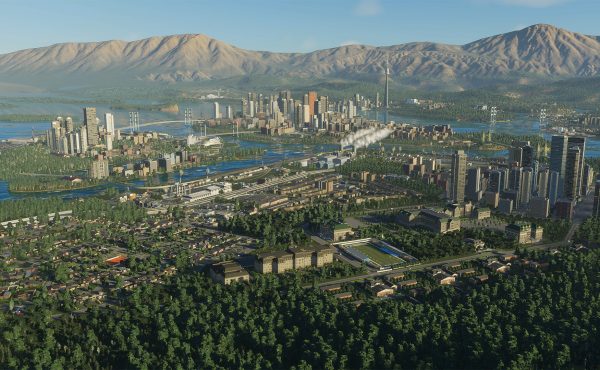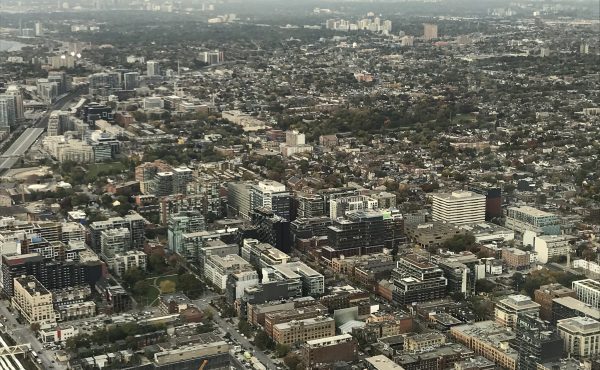There was a collective jaw drop when Premier Doug Ford announced, seemingly out of the blue, that Toronto’s wards would be decreased from 47 to 25. But the bigger shock was Mayor John Tory’s tepid response. Calling for a referendum, he conceded that, “the province has a broad authority to deal with the City of Toronto.”
The city’s residents deserved a clearer, more vigorous defence of Toronto as a democratic government. The Canadian constitution characterizes municipal governments as “creatures” of the provinces. But, the frayed 150-year old pages of the Constitution were created at a time when 80% of the country was rural, a demographic that has since entirely inverted. Municipalities are now profoundly important governments within our federal structure, with sole or shared responsibility for keeping our sidewalks clean and providing clean drinking water to big issues like housing, transit, and youth justice. Toronto is the fifth largest government in Canada, greater in size than the governments of Manitoba and Saskatchewan combined.
Our Constitution explicitly recognizes federal and provincial governments, and gives the latter responsibility for “municipal institutions.” However, a stream of case law over the last twenty years tells a more nuanced story.
Beginning in the 1990s, the Supreme Court of Canada adopted a more generous interpretation of municipal powers, calling for deference for and respect of decisions of locally elected officials. As former Chief Justice Beverley McLachlin observed, “The elected members of council are discharging a statutory duty. The right to exercise that duty freely and in accordance with the perceived wishes of the people they represent is vital to local democracy.” Municipalities cannot go beyond the powers granted to them in provincial legislation — which, in Toronto, means the City of Toronto, Act, 2006. Courts have ruled that, once empowered, provinces should defer and respect local action.
So far, there has been no legislation introduced by Ford’s new government to change the number of wards — just a threat. What this means in law, right now, is that the power for establishing, changing, or dissolving wards belongs exclusively to Toronto City Council. And this power has been exercised very recently.
For over four years, starting in 2013, the City undertook a sweeping ward boundary review. The current wards were the result of a 1999 provincial decision aimed at — as will sound ominously familiar — reducing the overall number of councillors. The province had designated 44 wards for Toronto: the 22 provincial/federal ridings, each of which would be divided in two. When the 2013 review began, ward populations across the city varied widely, with numbers ranging from 45,000 to 90,000 residents. The result was a wide discrepancy in representation. This meant that some residents had a much stronger voice. For example, ward 18 (in the former City of Toronto) and ward 29 (in the former Borough of East York) each contained fewer than 45,000 residents, approximately half of the population of ward 23 (in the former City of North York), which had almost 90,000 residents.
Council took action to correct this unhealthy disparity. Independent consultants stewarded the ward boundary review process, aimed at keeping it as free of political interference as possible. The process included multiple rounds of community consultation, meetings with all local elected officials and holding public sessions across all areas of the city.
With legally-defined principles guiding the process, the consultants offered several possible ward options, from small to large (including matching the federal/provincial ridings), which were then subjected to public review and comment. The exhaustive, meticulous process included a dozen reports, presentations to committee meetings and staff reports, culminating in the 47 ward model that received democratic approval at City Council in November 2017 and withstood a subsequent judicial challenge.
Rather than proposing a referendum, Tory should have vehemently defended Toronto’s existing power to create wards (at council Monday, members will also vote on a motion to ask staff for a legal strategy, which Tory has said he will support). The province can set the rules that municipalities must follow. But, once it does, the decisions of local governments — vital to our democracy — must be respected.
The mayor should also have defended the meticulous ward boundary approach, which was followed with careful attention to legal requirements that go beyond the city. A landmark 1991 Supreme Court of Canada case, the Carter decision, considered the meaning of the “right to vote” under the Charter of Rights and Freedoms.
In Carter, the court clarified that the number of voters in each riding was only one measure to assess effective representation. Other criteria matter too, like geography, community history, community interests, and minority representation. The Carter decision serves as the foundation for the way Ontario’s ward boundary reviews are assessed. It requires that processes be thoughtfully approached from an unbiased perspective and include public consultation.
Ford’s proposed ward fix raises crucial legal questions. For example, other municipal reviews have been overturned where councils determined the final number of wards before the review process began. But Ford’s suggestion does not even address the very problem the ward boundary review process sought to fix: unequal populations across city wards.
Toronto’s consultants used projected population data for 2026, while the federal electoral districts are based on already-stale 2011 census figures. Based on the consultants’ review, using federal boundaries would mean having four out of 25 wards — almost 20% of the total — that are unequal right out of the gate.
Municipalities may well be creatures of the province, but Ford cannot unilaterally ignore the Supreme Court of Canada. Toronto used its legal power to fix its outdated wards — a pressing, unglamorous process that took years. The upcoming election is not the equivalent of voting for a middle school president; it is a complex operation with thousands of candidates that takes city staff a year to execute. The location of the new wards has already set in motion other city decisions, such as the boundaries of community councils.
This is not the time for half-hearted reactions, such as the one John Tory expressed last week. Ford’s disregard for Toronto’s democratic government, and its residents, must be unequivocally — and legally — challenged.
Alexandra Flynn is a lawyer and Assistant Professor in Human Geography & City Studies at the University of Toronto (Scarborough). She previously worked as a senior policy advisor in the City Manager’s Office at the City of Toronto, with a focus on intergovernmental relations (including the City of Toronto Act review). Follow her on twitter at @alexandraeflynn.
photo by HiMY SYeD





5 comments
I agree there is too much government. But, it isn’t at City Hall. It is at Queens Park. There is one level of government we don’t need. Provinces. The federal government should be responsible for national security, pensions, health care, education and other matters that apply to everyone. Beyond that local matters are best handled by local government. Cities/towns etc.
Of course we will never get rid of Provinces but they are the unnecessary level of governance.
Wards need to be based upon local neighborhoods not artificial boundaries based largely on population as in Provincial and Federal boundaries.
Let us hope the Supreme Court of Canada settles this ASAP.
Alexandra Flynn wrote: The Canadian constitution characterizes municipal governments as “creatures” of the provinces.
Kevin’s comment: No, it does not. The word “creatures” does not appear in Canada’s constitution in reference to municipal government. See:
http://laws-lois.justice.gc.ca/eng/Const/page-4.html#h-19
I do not know what Alexandra was quoting from by putting the word “creatures” in quotation marks, but it certainly was not Canada’s constitution.
Excellent piece!
One may use quotation marks to indicate imprecision, as well as a direct extract from some document, speech, conversation, or similar source.
Wikipedia puts it:
“They are also used to indicate that the meaning of the word or phrase they surround should be taken to be different from (or, at least, a modification of) that typically associated with it” [1].
Here, “creatures” means that the organization of municipalities is an exclusive competence of the provincial legislatures, per section 92(8) of the Constitution.
The Ontario executive council (the provincial cabinet, including the premier) must respect the legislature’s delegation of its authority to a body other than a minister. However, the current legislature may freely amend the City of Toronto Act (COTA), as previous legislatures have done.
If it does so in a way that is unconstitutional, remedies are available through the courts.
However, the courts will generally give legislatures great deference on most matters, especially given open deliberations and affected parties are given the opportunity to be heard (e.g. during committee stage hearings), and especially in an area that is so clearly in section 92.
The Saskatchewan boundaries case was against a legislature acting unconstitutionally.
The Vancouver case determined that arm’s-length bodies established by provincial legislation can use their delegated authority as they see fit (secondarily, it was determined that the controversial resolution was within the powers delegated by statute).
It is relevant only peripherally; there is no question about whether Toronto has the power to organize its own affairs including the composition of the council, and the Vancouver case did not deal with an arm’s-length rule.
COTA s. 4 is privative — that is, it puts ministers at arm’s-length, effectively disallowing them from interfering with Toronto’s activities under COTA — so only an amendment to COTA would let Ontario ministers un-oust themselves from the power to set the size of city council.
The Saskatchewan case is relevant in that it establishes the standard of review that would be applied against a minister exercising authority under a hypothetical amended COTA (giving a minister the powers of COTA s. 4(3), for example, allowing him or her to change the composition of the city council) . The minister would have to act reasonably in making a change, and of course, constitutionally. This is the same standard of review that was applied against Toronto itself, as noted in the article.
Finally, I’m not sure why the former leader of Ford’s party would oppose a move that would make city council smaller and (possibly) more Conservative, so I’m not as surprised as the author that John Tory has not mounted a robust defence. Even if he opposed changing the size of council, John Tory is also a QC and presumably has some idea of how weak any possible defence would be in the face of a young majority government at Queen’s Park.
– —
[1] second sentence of first paragraph, https://en.wikipedia.org/wiki/Quotation_marks_in_English
At least the City did react reasonably well and strongly to this assault, including instructions to get the large legal department moving on options. Yes, it’s complicated, though it’s also very clear that TO is targetted by the FOrd, unlike Ottawa or Kingston, and every other town in Ontario This is a good source for some details: https://twitter.com/BBRyder/status/1024046088704208897 including how a 1968 Supreme Court ruling has embodied a spirit of protection of democracy in our Charter. Also there is now a Court process by Rocco Achampong to avoid having the legislation/Bill 5 enacted until his case is heard.